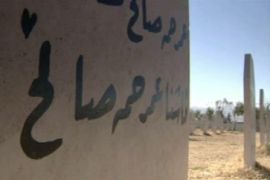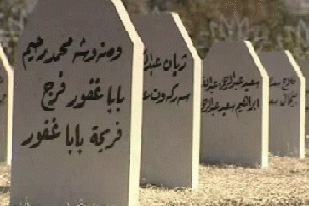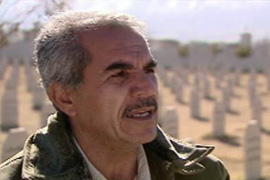Halabja welcomes end of Saddam era
Kurds in the town gassed by Iraqi forces in 1988 have little reason to mourn Saddam.

 |
| In a land filled with violence, Halabja still stands out |
Iraqi Kurds in the town of Halabja had more reasons than most to welcome Saturday’s execution of Saddam Hussein.
In March 1988, towards the end of the Iran-Iraq war, 5000 people died in a chemical attack by Iraqi aircraft on the town, which had recently been occupied by Iranian forces.
Al Jazeera’s Barnaby Philips visited a cemetery in the town to find out what relatives of the dead thought of Saddam’s executions.
Singing and dancing
By his father’s grave, Anwar Hasamim and his family search for comfort.
Today, as every day, haunted by the moment when a burning pain fell on their town.
The chemical attack left Anwar’s father injured but no doctor could treat him, and his eventual death came almost as a relief.
Saddam’s execution meant a lot to this family.
“When we heard the news, people gathered – singing and dancing and handing out sweets and visiting one another to celebrate,” Anwar says.
“I don’t think there is anyone happier than the people of Halabja to see the end of this era because we were the most oppressed during Saddam’s regime.”
Crumbling infrastructure
Today we know Iraq as a country numbed by horror, yet still Halabja stands out.
 |
| Garip Said has little sympathy for the former Iraqi leader |
Nineteen years have passed since Saddam’s atrocity and, in the meantime, there has been very little re-development and investment.
Today Halabja is a squalid town and many people complain that it has been badly neglected by the Kurdish government.
On the streets, people talk about corruption and wonder when someone will do something about the crumbling infrastructure.
Another mourner at the cemetary, Garip Said, whose two brothers died fighting Saddam says every true Kurd is glad to see the back of the former Iraqi ruler.
“As a human being you cannot be happy with the death of another person, even your enemy. But Saddam was a different case.
“He was a monster, and those executed him and witnessed it were not militia – they were true Iraqis who inflicted justice upon him.”
In Halabja, the evidence of Saddam’s crimes is written on the gravestones at the cemetery.
And Kurds here believe that peace was impossible while he lived.